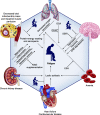Fatigue in CKD: Epidemiology, Pathophysiology, and Treatment
- PMID: 33858827
- PMCID: PMC8729574
- DOI: 10.2215/CJN.19891220
Fatigue in CKD: Epidemiology, Pathophysiology, and Treatment
Abstract
Fatigue is a commonly reported and debilitating symptom among patients with CKD, yet little is known about its epidemiology, pathogenesis, and treatment. Various measurement tools have been used in published studies to identify and quantify fatigue. These include several single-item measures embedded in longer questionnaires for assessing depression, quality of life, or symptom burden in patients with kidney disease. Approximately 70% of patients with CKD report fatigue, with up to 25% reporting severe symptoms. Patient-reported fatigue is associated with death, dialysis initiation, and hospitalization among individuals with CKD. The pathophysiology is multifactorial and likely includes decreased oxygen delivery and increased reliance on anaerobic metabolism, thus generating lactic acidosis in response to exertion; the effects of chronic metabolic acidosis and hyperphosphatemia on skeletal muscle myocytes; protein-energy wasting and sarcopenia; and depression. Physical activity has been shown to improve fatigue in some small but promising trials, and so should be recommended, given the additional benefits of exercise. Targeting higher hemoglobin levels with erythropoiesis-stimulating agents may improve fatigue, but potential adverse cardiovascular effects preclude their use to solely treat fatigue without the presence of another indication. Current guidelines recommend cautious individualization of hemoglobin targets for those at low cardiovascular risk who still experience fatigue or functional limitation despite a hemoglobin level of 10 g/dl. Sodium bicarbonate supplementation for the treatment of metabolic acidosis may also improve functional status. Selective serotonin reuptake inhibitors have not been consistently shown to improve fatigue in patients with kidney disease, but an ongoing trial will evaluate the effect of alternative antidepressant drug and behavioral activation therapy on fatigue in patients with CKD. Overall, more research is needed to further clarify underlying mechanisms of fatigue and identify effective, targeted treatments for patients with CKD.
Keywords: anemia; chronic kidney disease; depression; fatigue; functional impairment; protein-energy wasting; sarcopenia.
Copyright © 2021 by the American Society of Nephrology.
Figures


References
-
- Ju A, Unruh M, Davison S, Dapueto J, Dew MA, Fluck R, Germain M, Jassal SV, Obrador G, O’Donoghue D, Josephson MA, Craig JC, Viecelli A, O’Lone E, Hanson CS, Manns B, Sautenet B, Howell M, Reddy B, Wilkie C, Rutherford C, Tong A; SONG-HD Fatigue Workshop Collaborators: Establishing a core outcome measure for fatigue in patients on hemodialysis: A Standardized Outcomes in Nephrology-Hemodialysis (SONG-HD) consensus workshop report. Am J Kidney Dis 72: 104–112, 2018 - PubMed
-
- Wan Zukiman WZH, Yaakup H, Zakaria NF, Shah SAB: Symptom prevalence and the negative emotional states in end-stage renal disease patients with or without renal replacement therapy: A cross-sectional analysis. J Palliat Med 20: 1127–1134, 2017 - PubMed
-
- Murphy EL, Murtagh FE, Carey I, Sheerin NS: Understanding symptoms in patients with advanced chronic kidney disease managed without dialysis: Use of a short patient-completed assessment tool. Nephron Clin Pract 111: c74–c80, 2009 - PubMed
-
- Menting J, Tack CJ, Bleijenberg G, Donders R, Droogleever Fortuyn HA, Fransen J, Goedendorp MM, Kalkman JS, Strik-Albers R, van Alfen N, van der Werf SP, Voermans NC, van Engelen BG, Knoop H: Is fatigue a disease-specific or generic symptom in chronic medical conditions? Health Psychol 37: 530–543, 2018 - PubMed
Publication types
MeSH terms
Grants and funding
LinkOut - more resources
Full Text Sources
Other Literature Sources
Medical

